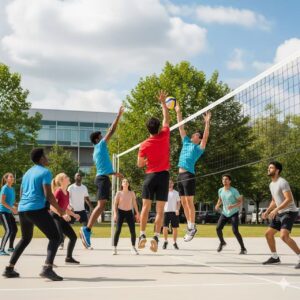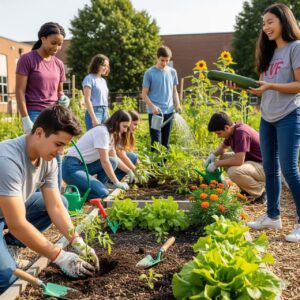In international education, the Creativity, Activity, Service (CAS) programme of the International Baccalaureate (IB) Diploma is often described as “the heart of the Diploma” (International Baccalaureate Organization, CAS Guide 2). This description is not an exaggeration. Unlike other core components such as exams, coursework, or subject assessments, CAS is not measured by grades. It focuses on growth, reflection, and meaningful action. At its best, CAS shapes young people into compassionate leaders, adaptable problem-solvers, and engaged world citizens.
As a CAS Coordinator, I have witnessed countless transformations. I have seen a shy student step in front of an audience and discover confidence through theatre. I have watched high achieving students who tied their identity purely to academics develop perseverance and balance through sports. I have accompanied students from privileged backgrounds as they engaged in service that not only opened their eyes but also shifted their life paths. CAS is not simply a requirement to finish during the IB Diploma years. It is a philosophy of learning, a training ground for life, and a guide that students carry long after they leave the classroom.
In this article, I want to explore why CAS matters, what it offers students, and how it prepares them with skills and outlooks that are increasingly essential in a world where content knowledge alone is no longer enough. 
Why CAS Matters in a World Beyond Content
Academic knowledge is important. Strong grades help open doors to good universities and contribute to career opportunities. Yet, more and more, universities, employers, and even communities are asking questions that go beyond academics: Can this young person collaborate effectively with others? Do they take initiative when things do not go as planned? Can they adapt with resilience? Most importantly, do they have a sense of social responsibility and an understanding of their broader role in society?
CAS directly addresses these questions. It pushes learning beyond “knowing” and into “doing.” Where academics may focus on theories and concepts, CAS ensures these are lived, tested, and grounded in real-world experiences. It also equips young people with empathy and an ethical framework, which are as essential as technical expertise in today’s rapidly changing world (OECD 7).
At its core, CAS ensures students:
- Participate in experiences that extend learning beyond classroom walls.
- Learn how to balance personal interests with responsibilities to others.
- Develop a long-term commitment to well-being, creative problem solving, and community development.
By prioritizing action as much as knowledge, CAS nurtures individuals who can not only succeed academically but also engage meaningfully with the challenges of our global society (International Baccalaureate Organization, What Is an IB Education? 4).
The Three Strands: Creativity, Activity, and Service
Creativity: Thinking Outside the Box
Too often, creativity is narrowly defined as artistic expression. CAS redefines creativity. It includes any experience that involves imagination, innovation, or originality. Students might design an app to connect volunteers with NGOs, launch a debate club, or create a digital campaign for environmental awareness. Creativity is about flexible and adaptive thinking, something that is vital in an unpredictable world (International Baccalaureate Organization, CAS Guide 11).
One of my favourite examples comes from a student who loved technology but had never thought of applying it beyond academics. For her CAS project, she designed a prototype app connecting young volunteers with local NGOs needing support. The project integrated her coding skills, her growing awareness of social needs, and her ability to think beyond traditional “creative” outlets. Years later, she mentioned that this CAS project inspired her career path at the intersection of technology and public service.
Activity: Strengthening Body and Mind
Activity encourages students to value their physical well-being and discover the connection between resilience in the body and resilience in the mind. From training for marathons to practicing yoga or leading a school football team, activity supports both health and discipline. More importantly, it teaches persistence in the face of challenges.
One student I worked with disliked sports. When required to choose an activity, she reluctantly tried hiking during CAS week. What began as a nervous first attempt gradually developed into a love for the outdoors. Years later, she credited her hiking experience as the origin of her persistence, something that carried her through demanding university studies. In moments when academics felt overwhelming, she found grounding by returning to hiking as a practice.

Service: Cultivating Empathy and Responsibility
Service is often the strand that resonates most deeply with students. When they step into real-world contexts and engage with communities different from their own, they begin to see themselves as global citizens.
Each time I observe a student tutoring underprivileged children, leading a recycling drive, or working on climate awareness campaigns, I see this awakening happen. Service helps them recognize that the world is bigger than themselves and that they are part of a global network of interdependence.
One group of students began a project to address food waste. Initially, it was one time food collection, but it soon evolved into a structured weekly initiative redistributing surplus meals. Over time, hundreds of families benefited. What truly transformed the students, however, was realizing that service is not charity. It is partnership, humility, and the commitment to long-term impact (International Baccalaureate Organization, CAS Guide 8).
Skills CAS Develops for the Future
The most evident benefit of CAS lies in the skills it nurtures. Unlike rote memorization or exam-based assessments, CAS allows students to develop and practice transferable skills that university life, careers, and personal journeys will demand.
- Collaboration and Leadership: Students learn to move between group roles, manage disagreements, and encourage peers. These experiences create adaptable leaders who can work in dynamic and multicultural contexts.
- Communication and Confidence: CAS provides countless opportunities for students to build clarity in expression. This confidence translates directly to university interviews, debates, and networking beyond school.
- Critical Thinking and Problem Solving: Projects rarely go exactly as planned. CAS teaches students to pivot and adapt.
- Self-Management and Balance: Balancing CAS commitments with demanding academics teaches discipline, prioritization, and reflection on time use (International Baccalaureate Organization, Approaches to Teaching and Learning in the Diploma Programme 5).
- Global Awareness and Ethical Engagement: CAS makes abstract issues like climate change or poverty personal through lived engagement, nurturing ethical citizens.
- Resilience and Emotional Intelligence: Failure is part of CAS. Learning to reflect on setbacks and bounce back is where students build resilience and maturity.
CAS and Academic Growth
A common misconception is that CAS remains entirely separate from academics. In reality, CAS often enhances academic performance and understanding.
When a biology student exploring water pollution engaged with an NGO focused on clean-water drives, her theoretical knowledge became grounded in reality. Similarly, students who created documentaries as part of creativity projects developed research, synthesis, and communication skills that directly supported their coursework.
Moreover, CAS experiences often enrich personal statements and university applications. Many universities today look beyond grades. They want evidence of leadership, initiative, and community impact. A powerful CAS portfolio can often make the difference between two competitive candidates (Kaye 34). 
CAS and Personal Growth
Beyond skills and academics, CAS nurtures profound personal growth.
- Identity and Self-Discovery: Many students discover passions they never knew existed.
- Wellbeing and Balance: CAS offers healthy outlets that counteract academic stress.
- Empathy and Cultural Understanding: By connecting with communities, students learn to break prejudices and nurture compassion.
- Agency and Voice: Students who identify problems and propose solutions learn early that they are not passive consumers of education but capable change-makers (Sisk 78).
Challenges and Misconceptions
It is not uncommon for students to begin CAS with resistance. Many complain that it feels like a burden. Others see service simply as charity or struggle to manage time. These misconceptions can be overcome with guidance. As coordinators and mentors, we must help them see CAS as a journey of discovery rather than just another task.
Parents, too, need reassurance that although CAS is not graded, the growth it brings is invaluable. Its measure of success lies in reflections, learning, and sustainable engagement rather than numbers on a report card (International Baccalaureate Organization, CAS Guide 3).
Conclusion: CAS as a Lifelong Compass
The future remains uncertain. Careers shift, societies evolve, and challenges such as climate change and inequality require urgent action. In such a world, CAS is more than a programme. It is a compass.
It shows students that success cannot be measured only by personal achievement. It is also about creativity, resilience, balance, compassion, and the responsibility to uplift others. While exams may open university doors, CAS is what gives students the courage and purpose to walk through those doors ready to make a difference. 
As I reflect on years of guiding CAS journeys, I am certain of one thing. While students may forget formulas or dates, they never forget the feeling of leading a creative project, the sense of pride in building resilience, or the face of someone their service touched. CAS leaves a mark long after grades are forgotten. It does not just prepare students for university; it prepares them for life (International Baccalaureate Organization, What Is an IB Education? 5).
Works Cited
International Baccalaureate Organization. Creativity, Activity, Service Guide. IBO, 2017.
—. Approaches to Teaching and Learning in the Diploma Programme. IBO, 2019.
—. What Is an IB Education?. IBO, 2014.
—. IB Learner Profile. IBO, 2013, updated 2019.
Kaye, Cathryn Berger. The Complete Guide to Service Learning: Proven, Practical Ways to Engage Students in Civic Responsibility, Academic Curriculum, and Social Action. Free Spirit Publishing, 2010.
OECD. The Future of Education and Skills: Education 2030. OECD Publishing, 2018.
Sisk, Dorothy. Nurturing Creative Intelligence in Young People: The Role of Self-Discovery and Service. Creative Education Press, 2016.
